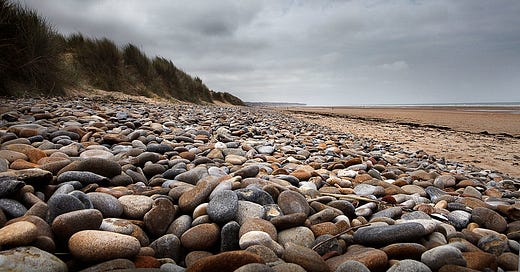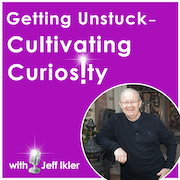I eyed the stone not because it had a particular shape or color but because it was indistinguishable from thousands of other stones on the beach, just like the men—boys really—who were indistinguishable from one another when they waded ashore that day under the relentless enemy machine-gunning, cutting many of them down before they could return fire, leaving many of them crying out for their mothers, bleeding all over the stones which decades later have been washed clean by the pounding surf like the stone I slip into my pocket as I fake tied my shoe, ignoring the sign that asks, “Please Don’t Pick Up Souvenir Stones” because I’ll probably only walk this sacred beach once in my life and then trudge up the zig-zag path to the top of the bluff like many of the soldiers did that day, fighting German boys and old men every step of the way, before breaking through to the flat ground 150 feet or more above the beach to what is now a cemetery for the fallen and missing, a white sea of names and “Unknown,” “Unknown,” “Unknown” on marble crosses and Stars of David, where, on top of any of them, I might be expected to leave the stone, as any Jew would leave a pebble or a small rock on a family gravestone to tell other mourners, “Someone was here to remember,” but, no, I have another resting place in mind where I can see the stone every day so the ghosts of those who died on or near it crying out for their mothers with their last breath will whisper how life can turn fast—on a beach with bullets turning you into pulp, or in your car that’s just been t-boned by a drunk, or by a doctor pointing out the white area on your CT scan—and remind me that I didn’t have to crawl across bloody stones crying out for my mother to learn the lesson.
I am headed to Western Europe this summer to tour battlefields where the American troops fought during WWI. I am compelled to walk where history happened—like Omaha Beach in Normandy, France, the setting for the above piece.
I walk the battlefields from both world wars, not out of some glorification of combat but out of a sense of disbelief that man can be reduced to killing one another on such an unimaginable scale. These places are noisy with the echoes of battle and death.
Here are recent podcasts with history-focused discussions or walks
World War I battlefields (British).
The Hurtgen Forest (Germany).






Beautiful, evocative, emotional, Jeff. And the one-sentence construction is perfect, just like waves on waves, ebbing and flowing.
Sounds like a wonderful trip. Can't wait to hear your stories. We had planned a similar trip in May, but have postponed because of the move. We will get there....